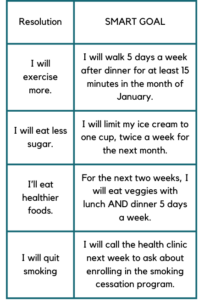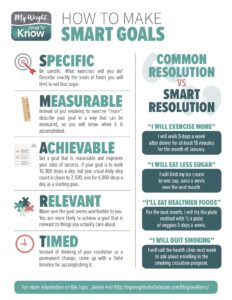By Melinda Maryniuk, MEd, RD, CDCES
It’s time for New Year’s resolutions again, but most people make them with the best of intentions, but end up breaking them. Why? It’s usually because we set goals for ourselves that are not SMART (specific, measurable, achievable, relevant and timed). Learn how to make resolutions that are SMART for your best year yet!
Follow these five guidelines when you’re coming up with your resolutions:
Specific – What specific exercises will you do? Describe exactly the kinds of foods you will limit to eat less sugar.
Measurable – Instead of just resolving to exercise “more”, describe your goal in a way that can be measured, so you will know when it is accomplished.
Achievable – Set a goal that is reasonable and improves your odds of success. If your goal is to walk 10,000 steps a day, but your usual daily step count is closer to 2,500, aim for 4,000 steps a day as a starting goal. You can achieve that! Set yourself up for success with a goal that is realistic and reasonable.
Relevant – Make sure the goal seems worthwhile to you. You are more likely to achieve a goal that is relevant to things you actually care about.
Timed – Instead of thinking of your resolution as a permanent change, come up with a finite timeline for accomplishing it. Plan to do something for a few weeks – and then evaluate and modify the goal if necessary.

In addition to creating SMART goals, consider these tips for setting successful resolutions:
- Set a daily intention – Begin each day by thinking of something small you will achieve that day. If you’ve got a list of things to do, do the hardest thing first to put it behind you.
- Keep track – Some people find it helpful to keep a record – paper or digital – to remind you of your goals and check off when you’ve accomplished them.
- Celebrate your success – When you accomplish your goal, take time to acknowledge it and really pat yourself on the back. Maybe even build in a small reward.
- Stay connected – Support from friends, family, and online communities like this one help you succeed!
- Don’t limit your health goals to weight loss – Think about other goals that can improve your health: getting adequate sleep, adding more activities that bring you joy, meditating to reduce stress, and practicing mindfulness.
- Remember – it’s a continuous process! Since goals are designed to be small and achievable, don’t stop once you achieve your short-term goal. Evaluate your goal and set it again… you’ll be amazed at what you can accomplish in time!

Diet and exercise alone aren’t enough to help many people reach a healthier weight. Medical treatments are needed to address the biological changes happening in our bodies that can drive weight regain. To find a physician near you who specializes in weight management, click here.
Get a weekly text to help you stay on track with your health goals! Click here to sign up.
This article was sponsored by Novo Nordisk Canada. All content is created independently by My Weight – What To Know with no influence from Novo Nordisk.

